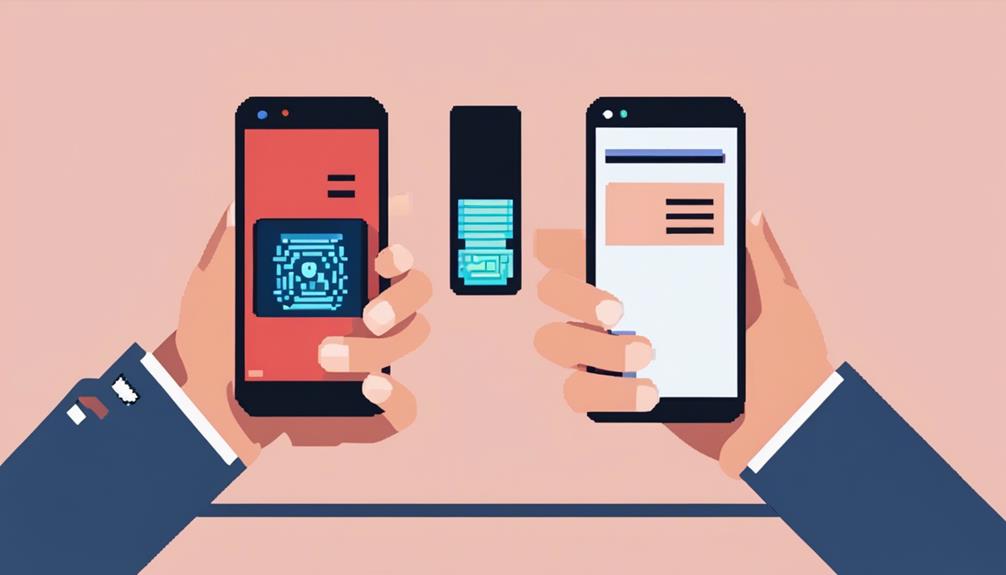Apple Wallet is safe from hackers due to robust security measures. Card details are tokenized and encrypted in the Secure Element, making it difficult for hackers to access sensitive information. Transactions require Face ID, Touch ID, or a passcode for authentication, adding an extra layer of security. Tokenization replaces card numbers with unique tokens, enhancing transaction security. Biometric authentication, like Face ID and Touch ID, offers additional protection. Apple Wallet prioritizes data protection through encryption and unique transaction codes. Implementing strong authentication methods and staying vigilant against cyber threats further enhance security. Explore more about Apple Wallet's security features for safe transactions.
Key Takeaways
- Apple Wallet uses tokenization to protect card details from hackers.
- Biometric authentication like Face ID adds an extra layer of security.
- Encryption and Secure Element keep sensitive data secure from cyber threats.
- Regularly update device software for the latest security patches.
- Avoid using public Wi-Fi networks for Apple Pay transactions for enhanced safety.
Security Measures of Apple Wallet
The security measures implemented by Apple Wallet greatly enhance the protection of sensitive card information against potential hacking threats. When a user adds their card to Apple Wallet, the actual card details are not stored on the device. Instead, the information is tokenized, generating unique transaction codes for each payment. These transaction codes are used for purchases, ensuring that actual card numbers are not shared with merchants, enhancing security.
Furthermore, card details stored in Apple Wallet are encrypted and kept secure in the Secure Element of the device. Even if a hacker gains access to the device, the encryption makes it nearly impossible to retrieve sensitive information.
Additionally, transactions made through Apple Wallet require authentication via Face ID, Touch ID, or a passcode, adding an extra layer of security.
Tokenization for Secure Transactions

Tokenization in Apple Wallet provides enhanced transaction security by replacing card numbers with unique tokens. These tokens serve as fraud prevention measures, safeguarding sensitive card details during payment processing.
Enhanced Transaction Security
By employing advanced tokenization technology, Apple Wallet guarantees enhanced transaction security by generating unique codes for each payment, thereby preventing the exposure of sensitive card information to potential hackers.
This method of tokenization ensures that actual card numbers are not shared during transactions, reducing the risk of data theft and fraud. The encrypted transactions in Apple Wallet create a secure environment where hackers are unable to intercept or misuse card details.
Through the use of tokenization, Apple Wallet adds an extra layer of protection by replacing sensitive card data with randomly generated tokens, safeguarding transactions from potential hacks. Each transaction within Apple Wallet is uniquely encrypted, providing a safe method for making secure payments without exposing personal card information to cyber threats.
This enhanced security feature sets Apple Wallet apart as a reliable and secure platform for conducting transactions securely and efficiently.
Fraud Prevention Measures
How does Apple Wallet guarantee secure transactions through innovative fraud prevention measures? Apple Wallet employs tokenization to ensure secure payments by generating unique, one-time use tokens for each transaction. This process replaces sensitive card information with random tokens, protecting against hackers accessing and exploiting actual card details. With tokenized transactions, Apple Wallet significantly raises the bar for hackers trying to intercept and misuse payment data. By utilizing tokenization, Apple Wallet adds an extra layer of security that reduces the risk of card information theft and unauthorized transactions, ultimately protecting users against fraud.
| Fraud Prevention Measures | Benefits |
|---|---|
| Tokenization | Generates unique tokens |
| Secure Payments | Replaces card information |
| Protect Against Fraud | Prevents unauthorized use |
| Tokenized Transactions | Enhances security |
Secure Payment Processing
Apple Wallet's implementation of innovative tokenization technology guarantees secure payment processing by safeguarding sensitive card information with unique, one-time use codes. When a transaction is initiated through Apple Wallet, tokenization replaces the actual card details with a random code, preventing hackers from accessing valuable information.
This process ensures that encrypted transactions occur securely, thanks to the Secure Element technology in Apple devices that stores and protects tokenized data. By using tokenized transactions, Apple Wallet adds an extra layer of security by avoiding the sharing of actual card numbers, minimizing the risk of data breaches and unauthorized access.
Through these measures, Apple Wallet enhances transaction security, providing users with peace of mind when making purchases. This advanced technology not only protects users from potential threats posed by hackers but also streamlines the payment process by guaranteeing swift and secure transactions.
Biometric Authentication for Added Security

Biometric authentication, like Face ID and Touch ID, provides an additional layer of security for Apple Wallet transactions. Face ID uses facial recognition technology to confirm the user's identity, while Touch ID scans the user's fingerprint for secure authentication.
Biometric Authentication Benefits
The implementation of biometric authentication in Apple Wallet provides enhanced security measures through unique physical identifiers for transaction verification. Features like Face ID and Touch ID offer users a secure way to access their Apple Wallet and authorize transactions, safeguarding against unauthorized access and potential hacking attempts.
Face ID utilizes facial recognition technology, making it challenging for unauthorized individuals to breach the security of Apple Wallet. Touch ID, on the other hand, allows users to use their fingerprints as unique identifiers for secure transactions, enhancing transaction security and protecting financial information.
Biometric authentication methods like Face ID and Touch ID are more secure than traditional passwords or PIN codes, as they are specific to each user and harder to replicate or steal. By incorporating biometric authentication into Apple Wallet, users can guarantee the protection of their financial information and enjoy secure transactions without the fear of hacking attempts or unauthorized access.
Enhancing Transaction Security
Enhancing transaction security with advanced biometric authentication methods provides robust protection for user data in digital wallets. Utilizing biometric features like Face ID and Touch ID enhances Apple Wallet security, ensuring secure transactions.
Face ID utilizes facial recognition technology for transaction authentication, adding an extra layer of security to Apple Wallet.
Touch ID scans the user's fingerprint to authorize transactions, ensuring only the device owner can access Apple Wallet.
Biometric authentication in Apple Wallet minimizes the risk of unauthorized access by requiring the user's unique biological features for verification.
These advanced security measures make it challenging for hackers to breach Apple Wallet, guaranteeing a secure environment for transactions.
Risks of Cyber Threats to Apple Wallet

Cyber threats pose a significant risk to the security of Apple Wallet, potentially exposing users to financial vulnerabilities and unauthorized access to sensitive payment information. Hackers may exploit device vulnerabilities or use social engineering tactics like phishing scams to gain unauthorized access to Apple Wallet. This unauthorized access could lead to unauthorized transactions and compromise the security of sensitive payment data stored in the wallet.
To mitigate these risks, users should remain vigilant and be cautious of potential phishing scams that could compromise their Apple ID, allowing hackers to exploit the wallet. Implementing security measures like two-factor authentication and keeping devices updated can help bolster the protection of Apple Wallet from cyber threats.
Data Protection in Apple Wallet

Data security measures within Apple Wallet prioritize the protection of sensitive user data.
- Encryption is utilized to safeguard details like card information and transaction data.
- Transactions in Apple Wallet involve device-specific numbers and unique transaction codes to enhance security.
- Apple Wallet does not retain original card numbers or transaction specifics, ensuring an added layer of protection.
Tips to Enhance Apple Wallet Security

To bolster the security of your Apple Wallet, consider implementing the following proactive measures.
Enable two-factor authentication on your Apple devices to add an additional layer of security for Apple Pay transactions.
Regularly review your Apple Pay transaction history to promptly identify any unauthorized charges.
Keeping your device's software up to date is essential as it guarantees the latest security patches are in place, reducing vulnerabilities.
Set up strong authentication methods such as Face ID, Touch ID, or a secure passcode for enhanced security during Apple Pay transactions.
It's advisable to avoid using public Wi-Fi networks when making Apple Pay transactions to mitigate potential security risks associated with unsecured connections.
Ensuring Safe Transactions With Apple Wallet

Enhancing the security of transactions conducted through Apple Wallet is crucial to safeguarding sensitive financial information and preventing unauthorized access. To guarantee safe transactions with Apple Wallet, consider the following:
- Utilize tokenization: Apple Wallet employs tokenization to protect card details, replacing sensitive information with unique tokens during transactions.
- Implement strong authentication: Transactions in Apple Wallet are encrypted and require authentication through methods such as Face ID, Touch ID, or a secure passcode for added security.
- Leverage Secure Element: Card information stored in Apple Wallet is kept secure within the Secure Element, inaccessible to unauthorized apps or potential hackers.
Frequently Asked Questions
Is Apple Wallet Secure From Hackers?
Apple Wallet maintains high security standards to protect transactions. Utilizing one-time use tokens and encryption, it minimizes the risk of hacking. Stolen card details are useless, as the bank stores them. Device security is critical to prevent unauthorized purchases.
How Trustworthy Is Apple Wallet?
Apple Wallet instills trust through robust security measures, including encryption, tokenization, and biometric authentication, ensuring secure transactions. With Apple's unwavering commitment to privacy and data protection, users can rely on Apple Wallet for safe financial interactions.
Is Using Apple Wallet Safe?
Utilizing Apple Wallet for digital transactions is a secure choice thanks to its robust security features. With one-time use tokens, encrypted data, and bank verification, Apple Wallet guarantees safe and reliable transactions, offering peace of mind to users.
Can Someone Steal Credit Card Info From Apple Wallet?
While concerns may arise around the security of credit card information stored in Apple Wallet, the platform's encryption, tokenization, and multi-factor authentication measures provide robust protection against potential theft, mitigating the risk of unauthorized access and ensuring secure transactions.
Conclusion
To sum up, the security measures implemented in Apple Wallet, such as tokenization and biometric authentication, make it a safe platform for transactions. However, the risks of cyber threats still exist, emphasizing the importance of data protection and enhanced security practices.
By following tips to strengthen Apple Wallet security, users can guarantee safe transactions and protect their financial information. Just as a sturdy lock safeguards a valuable treasure, Apple Wallet's security features shield your transactions from potential threats.









